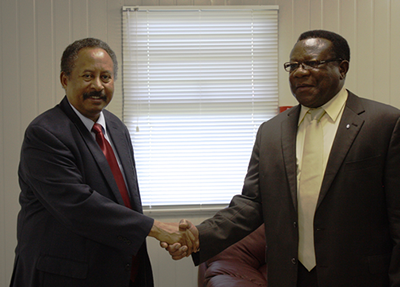 The United Nations Economic Commission for Africa (ECA) represented by Dr. Abdalla Hamdock, Deputy Executive Secretary, ECA and Prof. Emmanuel Nnadozie, Executive Secretary of the African Capacity Building Foundation (ACBF) are to sign a Memorandum of Understanding (MOU) on a three years partnership to build human and institutional capacity in Africa. The signing will take place on 16 January 2015 at the ACBF secretariat in Harare, Zimbabwe.
The United Nations Economic Commission for Africa (ECA) represented by Dr. Abdalla Hamdock, Deputy Executive Secretary, ECA and Prof. Emmanuel Nnadozie, Executive Secretary of the African Capacity Building Foundation (ACBF) are to sign a Memorandum of Understanding (MOU) on a three years partnership to build human and institutional capacity in Africa. The signing will take place on 16 January 2015 at the ACBF secretariat in Harare, Zimbabwe.
The MOU between ECA and ACBF will form a basis for partnership between the two organizations to work together on joint programs and activities that are of mutual interest. Key programmatic areas will include:
- Capacity Development for Transformative Leadership,
- Capacity Development to Track, Stop and Return Illicit Financial Flows,
- Enhancing the Capacity Development of African Peer-Review Mechanism (APRM) Countries,
- Policy Research on Root Causes and Development Consequences of Conflict in Africa,
- Case Studies on Gender Equitable Growth and Development in Selected African Countries and
- Implementing a Data Revolution in Africa.
Other areas of the partnership include economic policy analysis and management, regional integration, trade capacity, gender and capacity building, information, communication and technology, knowledge management, statistics, governance, institutional building and monitoring and evaluation.
The two organizations will re-enforce modalities for providing services and support to member States and Regional Economic Communities (RECs) on capacity building interventions in key areas such as policy analysis and advocacy; consensus building on Africa’s key development challenges; and the provision of technical assistance to member countries, African institutions, and civil society organizations. Through the new agreement, the ECA and ACBF will continue to exchange information on events of interest to Africa and the two Institutions and extend invitation for joint organization and participation; exchange of different publications and reports produced and; share of profiles, contacts and products of partners, mainly policy think tanks that the two Institutions are partnering with.
The co-operation and collaboration between ECA and ACBF will not only serve their common objectives but also render their respective programs and activities more effective and beneficial to African countries. The comparative advantage of the partnership will ensure demand-driven support and realize synergies between their efforts.
This will be the third time the ECA and ACBF are getting into partnership. The first MOU was signed on the 6th December 2008 and extended for the second time on 16th September 2011.
About the African Capacity Building Foundation
Established in 1991, ACBF builds human and institutional capacity for good governance and economic development in Africa. To date the Foundation has empowered people in governments, parliaments, civil society, private sector and higher education institutions in more than 45 countries and 6 regional economic communities. ACBF supports capacity development with grants, technical assistance and knowledge across Africa.
The establishment of ACBF was in response to the severity of Africa’s capacity needs, and the challenges of investing in indigenous human capital and institutions in sub-Saharan Africa. ACBF interventions are premised on four principles: the centrality of capacity to the development process in Africa; the critical role of a partnership and demand driven approach in tackling capacity challenges; African ownership and leadership in the capacity development process; and a systematic, sequenced and coordinated approach to the capacity development process.
About the United Nations Economic Commission for Africa
The ECA is the regional arm of the United Nations in Africa. It has a special role to play in translating the Continent’s overarching developing vision through strategic partnership with key regional African institutions in support of the economic and social development of its 53 member States, and fostering regional integration, and promoting international cooperation for Africa’s development.For further information go to: www.uneca.org





